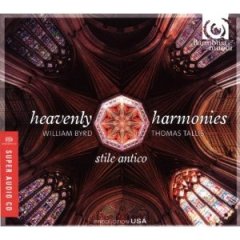William Byrd & Thomas Tallis - Heavenly Harmonies (2007)
William Byrd & Thomas Tallis - Heavenly Harmonies (2007)

1. Third Tune: Why fum'th in fight 0:55 2. Cantiones sacrae I: Vigilate 4:15 3. Fifth Tune: E'en like the hunted hind 1:04 4. Cantiones sacrae I: Ne irascaris Domine 9:38 5. Second Tune: Let God arise 0:51 6. Cantiones sacrae II: Exsurge Domine 4:30 7. Sixth Tune: Expend, O Lord 1:10 8. Cantiones sacrae II: Infelix ego 16:03 9. Eighth Tune: God grant wtih Grace 1:34 10. Cantiones sacrae I: Laetentur coeli 3:39 11. First Tune: Man blest no doubt 1:11 12. Cantiones sacrae II: Quis est homo 7:13 13. Veni creator: Come Holy Ghost 0:31 14. Mass Propers for Pentecost: Introit: Spiritus Domini 4:31 15. Mass Propers for Pentecost: Offertory: Confirma hoc Deus 2:08 16. Mass Propers for Pentecost: Communion: Factus est repente 1:43 17. Seventh Tune: Why brag'st in malice 0:46 18. Cantiones sacrae I: Tribulationes civitatum 10:27 19. Fourth Tune: O come in one to praise the Lord 0:59 20. Cantiones sacrae II: Laudibus in sanctus 5:33 Performer: Stile Antico
The Elizabethan era was marked by religious turmoil that roiled the realm: the Catholicism of the late Queen Mary, now officially suppressed under Elizabeth, was still selectively tolerated, producing profound social tensions that were reflected in the lives and music of two of England's finest composers, William Byrd and Thomas Tallis. Byrd's Catholicism is powerfully evident in his Motets, which were written for recusant Catholics, practicing their faith in secret, forced to furtively celebrate Mass in hidden rooms where priests lived concealed, often for years. Byrd's masterful setting of the Motets' Latin texts usually contained subversive political overtones, messages not lost on those risking all by still embracing an outlawed faith. The Motets brilliantly explore the expressive capabilities of choral polyphony with a response to the emotional qualities of the text that is deeply sensuous: featuring satiny vocal textures and lush harmonies of aching beauty that hint at the loss of paradise and a mingling of sorrow and hope.
Tallis wrote his psalm tunes in 1567, a paradigm of the Protestant musical aesthetic, with their vocal austerity in which the clarity of the biblical words is essential. There is no need for concealment here, everything is illuminated. Stile Antico have once again released a concert in which the strife of two clashing religious cultures is reflected in the music, creating a splendid musical tension. And as an almost subliminal subtext, this tension produces a sonic narrative that adds weight to the purely musical elements. Paradoxically, the relative lightness of the vocal textures combines with the added depth of (background) meaning and with the profundity of the biblical text to produce a rare musical sublimity. Stile Antico create a sonorous portrait of a powerful religious faith: compelled to worship, even under circumstances most dire, in music of such unearthly beauty that it seems to suspend time. There is a relationship between faith and beauty, and here, stripped of all superfluities, that relationship is explored with matchless grace and skill. Heavenly Harmonies is an appropriate name for a concert lasting nearly 80 minutes, but which seems to pass in an instant. The Hybrid SACD sound is crystalline with proper church reverberation lending added heft to the vocal textures. This CD offers a timeless heavenly vision as glimpsed by two of the finest of Renaissance composers. Mere praise may not do it justice. Listen for yourself and discover what beauty once graced the world. Most strongly recommended. ---Mike Birman
download: uploaded anonfiles mega 4shared mixturecloud yandex mediafire ziddu
Last Updated (Wednesday, 25 September 2013 10:13)








